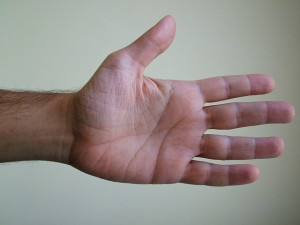that happens regularly, that’s certain
[Dutch phrase of the week]
[dat is vas-te prik] ![]()
 When something is ‘vaste prik’ in Dutch it means that something happens with a certain regularity, or something happens so often and regularly that it has become a certainty. The phrase is also used in the form ‘[subject/topic] is vaste prik’.
When something is ‘vaste prik’ in Dutch it means that something happens with a certain regularity, or something happens so often and regularly that it has become a certainty. The phrase is also used in the form ‘[subject/topic] is vaste prik’.
The phrase apparently dates back to the practice of tax collectors to carry a stick that they punctured or made small cuts in to help them determine the amount of tax paid (as a counting aid). Such a stick is called ‘kerfstok’ in Dutch (for which I can’t find a translation).
Examples:
– “Op wie wachten we nu nog?” – “O, op Frank, dat is vaste prik met hem op vrijdag, dan is hij altijd te laat.”
(“So who are we still waiting for?” – “Oh, for Frank, it’s always the same thing with him, on Fridays he’s late.”)
– “In het begin ging ik af en toe hardlopen in het weekend, maar nu is het inmiddels vaste prik.”
(“At first I used to go running in the weekends every now and then, but by now it has become a habit.”)
– “Het is tegenwoordig vaste prik voor alle professionele atleten; na elke wedstrijd is er dopingcontrole.”
(“Nowadays it is certain that professional athletes have to undergo a dope/drug test after a match/game.”)
– “Toeristen die niet uitkijken bij het oversteken, vaste prik in Amsterdam, vormen vaak een gevaar voor zichzelf.”
(“Tourists who do not watch out when crossing the street, almost a given in Amsterdam, often pose a danger to themselves.”)
– “Voor Sheldon Cooper is pizza vaste prik op donderdagavond.”
(“Thursday night is pizza night for Sheldon Cooper.”)
Related words:
– Prik: prick, prod, injection/inoculation [noun] [de prik, de prikken]. ‘Prik’ is also the Dutch word for ‘pop/fizz’.
– Prikken: to prod/puncture/pin, to inject/inoculate, to set/fix a date [verb] [prikte, geprikt].
Example:
– “Het is met werkende mensen altijd lastig om een datum te prikken.”
(“It is always difficult to fix a date with people who work / have jobs.” In this meaning of ‘prikken’ the verb is probably derived from marking a date on a calendar with a pin.)
– Frequent: frequent(ly) [adjective/adverb].
– Regelmatig: regular(ly) [adjective/adverb].
– Altijd: always [adverb].
– Zeker: certain, absolute(ly) [adjective/adverb].

 In Dutch the noun ‘voorraad’ is used for supply/stock that is available for sale, supplies you may have at home, or general supply/quantity available for use.
In Dutch the noun ‘voorraad’ is used for supply/stock that is available for sale, supplies you may have at home, or general supply/quantity available for use. Literally ‘in the turn of a hand’ this says that something can be done quickly and without effort, with one move of the hand… So, let’s do this DWOTD in een handomdraai!
Literally ‘in the turn of a hand’ this says that something can be done quickly and without effort, with one move of the hand… So, let’s do this DWOTD in een handomdraai! The adjective ‘verantwoordelijk’ is translated as ‘responsible’ in both the meaning of ‘accountable/answerable’ and ‘part of your duties’. Something can also be ‘verantwoordelijk’ when it brings responsibility with it such as a job (‘baan’).
The adjective ‘verantwoordelijk’ is translated as ‘responsible’ in both the meaning of ‘accountable/answerable’ and ‘part of your duties’. Something can also be ‘verantwoordelijk’ when it brings responsibility with it such as a job (‘baan’).